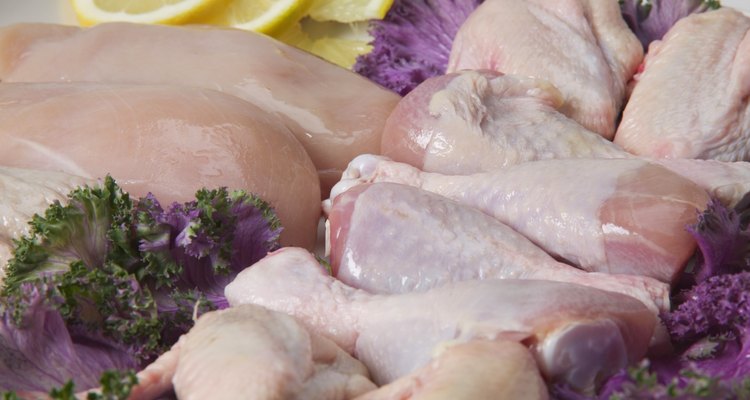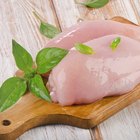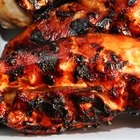
Get a head start on your evening meal by adding a marinade to chicken while it's still defrosting. The marinade won't become fully effective until the chicken is thawed, but it makes sense to prepare the chicken all at once. When you're ready to cook the chicken, drain the marinade and discard it. If you want to reuse it as a glaze, bring it to a full rolling boil to destroy any bacteria present.
Maximize the Taste
You can add a marinade to partially defrosted chicken, but keep in mind that the flavors in the marinade won't penetrate the chicken until it defrosts. Even then, a marinade only penetrates the top 1/4 inch of the poultry. Make sure you leave the poultry in the marinade for at least two to four hours after it's fully thawed for maximum flavor, depending on the type of marinade. Don't wipe the marinade off the chicken before you cook it. Check the chicken is cooked to an internal temperature of 165 degrees Fahrenheit before serving it.
Chill Out
Marinated chicken that's still partially frozen should be kept in the refrigerator at 40 degrees Fahrenheit or cooler. At this temperature, the meat will continue to thaw, but you significantly reduce the risk of foodborne illness. Never thaw or marinate chicken at room temperature, because the bacteria in the chicken quickly multiply, increasing your chance of getting sick.
Keep It Simple
You can marinate partially frozen chicken in almost any container, including plastic, glass or stainless steel pans, but a zip-top plastic bag is most convenient. Plastic bags trap both the marinade and any juices exuded from the chicken as it thaws. Use about 1/2 cup marinade per 1 pound of chicken and make sure the marinade completely covers the meat. Turn the chicken from time to time as it marinates.
Watch the Time
Although you can safely leave marinating chicken in the refrigerator for at least two days without risk of spoilage, you may not want to, depending on the ingredients in the marinade. Acidic marinades, including citrus juices, wine and vinegar, denature -- or cause the proteins to unwind and mesh together -- and can toughen chicken. Marinades that contain enzymes -- such as pineapple or papaya juice -- break down the proteins and can lead to mushy meat. Use marinades containing wine, vinegar or salt for no more than four hours after the chicken has thawed. Marinate with citrus-based marinades for no more than two hours after the chicken has thawed. Remove the chicken immediately if it begins to turn white or gray. The marinade is "cooking" it, which will toughen it.
Related Articles

How to Defrost a Chicken in a ...

How to Marinate Roast Chicken

Does Chicken Go Bad if You Marinate It ...

How to Cook Mojo Chicken

Can I Cook a Chicken Five Days After ...

How to Par-Cook Chicken Before Frying

If Chicken Smells Bad Can You Still ...

How to Marinate BBQ Chicken Thighs & ...

Can I Cook Chicken Two Weeks After the ...
Easy Pork Chop Marinade Recipe

How to Cook Half a Breast of Chicken

How Long Can I Keep Frozen Whole ...

Can I Stop Cooking a Chicken Halfway & ...

How to Slow Cook Chicken With Tomatoes ...

How to Soak Chicken in Cold Water

What Happens to Boneless Chicken if I ...

How to Cook Corned Beef Without Being ...

Can I Cook Chicken That's Been Thawed ...

How to Defrost a Steak and Keep It ...

How to Make Crock-pot Chicken
References
Writer Bio
Julie Christensen is a food writer, caterer, and mom-chef. She's the creator of MarmaladeMom.org, dedicated to family fun and delicious food, and released a book titled "More Than Pot Roast: Fast, Fresh Slow Cooker Recipes."
Photo Credits
Jupiterimages/liquidlibrary/Getty Images